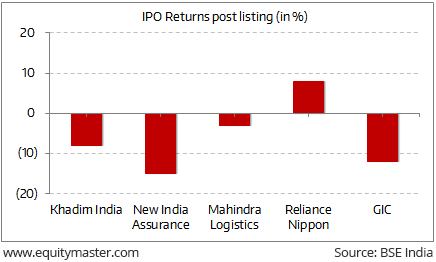After opening the day in green, share markets in India witnessed choppy trading activity and are presently trading flat. Sectoral indices are trading mixed with stocks in the banking sector and stocks in the PSU sector trading in red. While stocks in the FMCG sector are trading in green.
The BSE Sensex is down by 45 points (down 0.1%) and the NSE Nifty is trading down by 20 points (down 0.2%). Meanwhile, the BSE Mid Cap index is trading down by 0.2%, while the BSE Small Cap index is trading down by 0.1%. The rupee is trading at 64.89 to the US$.
In news from stocks in the FMCG sector. Fast-moving consumer goods major Hindustan Unilever (HUL) said that it will the government another tranche of goods and services tax (GST) benefits that it could not pass on to consumers.
HUL had by itself handed over to the government Rs 1.19 billion in two tranches of Rs 600 million and Rs 590 million for November and December, which is yet to be deposited in the Consumer Welfare Fund.
However, The Directorate General of Safeguards (DGS) has sought clarifications from HUL% on the methodology used to arrive at Rs 1.19 billion that the company offered to the government after it could not pass the entire benefits of GST.
Since the past two months, DGS, the investigation arm of the revenue department, has been checking to make sure companies are passing on the benefits of lower levies under the goods and services tax (GST) regime to consumers. In November, the GST Council dropped tax rates on 200 products, including chocolates, toothpaste, shampoo, washing powder and shaving creams, to 18% from 28%.
The Union Cabinet approved the setting up of the anti-profiteering authority under the GST regime in a bid to ensure that the benefit of lower rates is passed on to consumers.
Anti-profiteering measures will provide an institutional framework to ensure that the full benefits of input tax credits and reduced GST rates on goods or services flow to consumers. This institutional framework comprises the National Anti-Profiteering Authority (NAA), a Standing Committee, a Screening Committee in every state and the Directorate General of Safeguards under the Central Board of Excise and Customs (CBEC).
Crucially, the authority has been granted wide-ranging powers, including to cancel the registration of offending firms in extreme cases.
According to the rules, if the NAA confirms that there is a need to apply anti-profiteering measures, then it has the authority to order the supplier to reduce its prices or return the undue benefit availed by it along with interest to the recipient of the goods or services. If this can’t be done, then the company can be ordered to deposit the amount in the Consumer Welfare Fund.
India’s Tax Revenues to Get a GST Boost

The current GST regime has created a lot of uncertainties, at least for the time being. On the corporate earnings front, the GST implementation may impact near term earnings of the companies however, over a long run, the market expectations are that earnings would normalize. In addition, it is expected to be a big support to the depressed earnings of the organised listed Indian companies.
As we have saying, GST is a much-needed economic reform, and measures such as setting up of the NAA in order to ensure its efficacy are a step in the right direction. It should eventually expand India’s narrow tax base and increase government revenues.
That said, every coin has two sides. GST is no exception. It has had its fair share of chaos in the months immediately post its implementation from 1 July 2017. Many businesses reported depressed earnings due to the transition to GST.
Our colleague Vivek Kaul has studied the finer aspects of the GST and predicted what could go right and wrong.
Download his special report — The Good, the Sad and the Terrible (GST).
In news from the banking sector. Airtel Payments bank, run by the country’s largest telecom operator, Bharti Airtel, slashed its interest rates 175 basis points (bps) to 5.5% per annum, effective 1 March 2018.
The payments bank, first such to launch in 2017, said the management was trying to keep rates competitive and was keeping it higher than or at par with competition.
Notably, the payments bank had begun with an introductory interest rate offering of 7.25% per annum, which it now says was only an introductory offer.
Last year, the Unique Identification Authority of India (UIDAI) had temporarily barred Bharti Airtel and Airtel Payments Bank from conducting Aadhaar-based SIM verification of mobile customers using eKYC process, as well as e-KYC of payments bank clients.
Bharti Airtel was allegedly using the Aadhaar e-KYC-based SIM verification process to open payments bank accounts of its subscribers without their ‘consent’. The UIDAI also took strong objection to allegations that such payments bank accounts were being linked to receive a cooking gas subsidy.
At the time of writing, Bharti Airtel share price was trading up by 1.1%.
For information on how to pick stocks that have the potential to deliver big returns, download our special report now!
Originally published at www.equitymaster.com.


